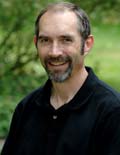Did Peter’s Vision in Acts 10 Pertain to Men or the Menu?
Chris A. Miller, “Did Peter’s Vision in Acts 10 Pertain to Men or the Menu?” Bibliotheca Sacra 159 (July-Sept 2002), pages 302-17.
Over the years I have been interested in the various interpretations of Peter’s dream in the 10th chapter of the Book of the Acts of the Apostles. It is interesting to take a glimpse at the range of theories and the support for those theories.
Admittedly as a Messianic believer, my opinions already lean in support of a “whole Bible” approach to shaping my theological beliefs. So it was with great delight that I encountered Chris Miller’s article as he allows the text to interpret itself, dispelling some of the popular but inaccurate applications of this pivotal passage in Peter’s life, and in the life of the community of the redeemed.

Chris A. Miller is Assistant Dean at Cedarville University in Cedarville, Ohio.
Miller insightfully points out what we know about Peter and what we know about his hosts Simon the tanner and Cornelius the centurion. Each character study demonstrates that all appear to have been living a biblical lifestyle in every way, right down to what they ate. Verse 2 tells us that Cornelius was “a devout man, and one who feared God with all his household, and gave many alms to the Jewish people, and prayed to God continually” (NASB). God-fearers were Gentiles that had attached themselves to the God of Israel and His people. Even in verse 3 we find him in prayer at the ninth hour, the hour of the afternoon sacrifices in the temple, and the time for corporate prayer.
As Miller points out, “It is hard to imagine that one so sympathetic toward the Jewish nation would be so insensitive as to offer unclean food to his guest, for whose arrival he had four days to prepare and at whose feet he fell at their first meetings” (p. 310).
It is this type of logic that flows throughout Miller’s well-documented and footnoted article. In his final analysis, “Luke’s formidable skills as a writer drew out the lesson of Peter’s vision to people. As the angel and Peter entered Cornelius’s house, so also Cornelius entered God’s ‘house.’ God has now granted the Gentiles not only repentance unto life, but also the fullness of the Holy Spirit and full acceptance into His house-hold as first-class citizens” (p. 316).
Regretfully, Miller (as well as many other commentators) does not address one of the issues at hand. As he writes, “Simply eating with Gentiles was a significant charge in itself . . .” (p. 309). This thought is based on Peter’s own words, “And he said to them, ‘You yourselves know how unlawful it is for a man who is a Jew to associate with a foreigner or to visit him’” (Acts 10:28 NASB). Yet never does God’s Torah stipulate that a Hebrew and a Gentile may not associate nor share a meal! This is not the Torah the Law of the God of Israel. It is however, a part of the torah (small “t”) otherwise known as the oral tradition of the religious community. This torah created many rules and regulations prohibiting the interaction of Hebrews and Gentiles and became the middle wall of partition evident in synagogues and kosher restaurants today. The message to Peter may have been the same message Paul wrote for us in Ephesians 2:14, “For He Himself is our peace, who made both groups into one, and broke down the barrier of the dividing wall” (NASB).
Category: Biblical Studies, Winter 2003


